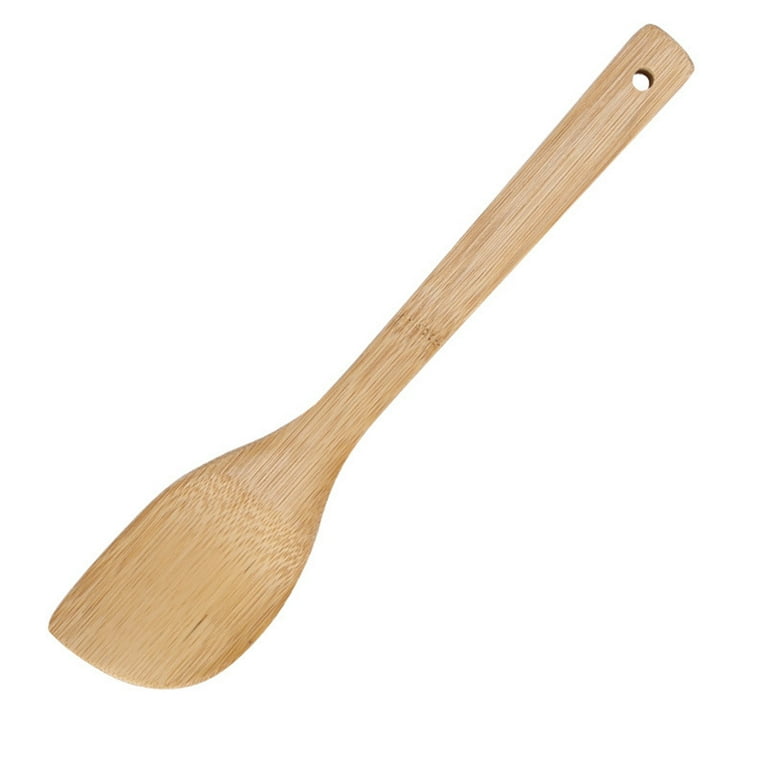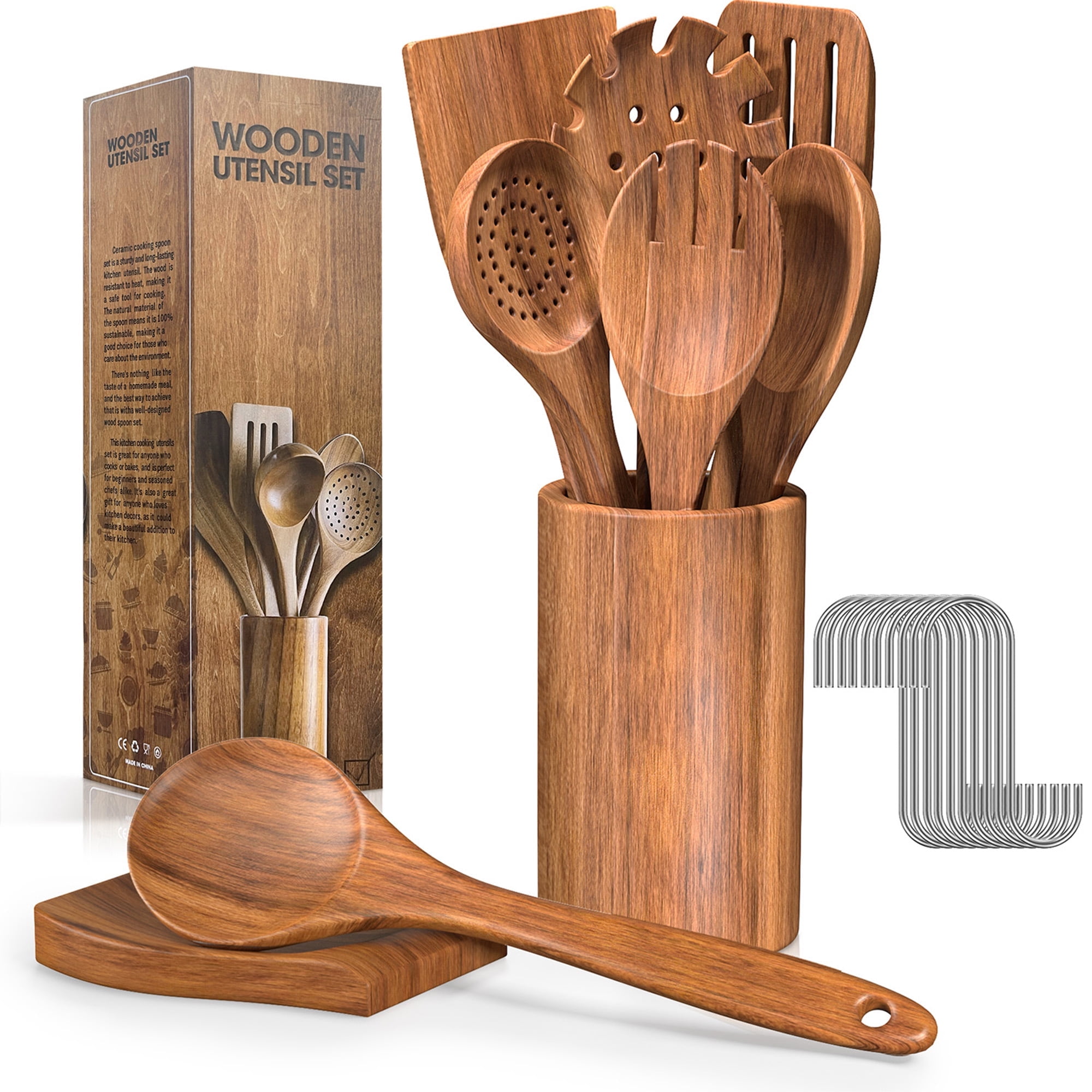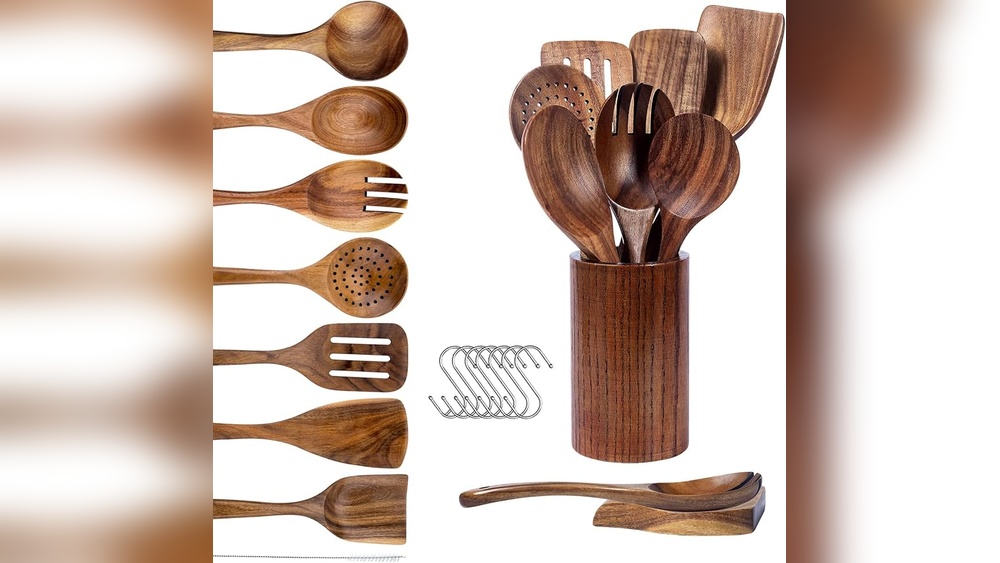Are you wondering if wooden spoons are safe to use with your non-stick pans? You’re not alone.
Choosing the right utensils can make a big difference in keeping your cookware in top shape. Using the wrong tools might damage the non-stick surface, costing you money and frustration. But wooden spoons? They seem gentle, right? Let’s dive into the facts so you can protect your pans and cook with confidence every time.
Keep reading to find out what makes wooden spoons a smart choice—or not—for your non-stick cookware.

Credit: www.walmart.com
Benefits Of Wooden Spoons
Wooden spoons have been a kitchen favorite for many years. They offer several benefits that make them ideal for cooking, especially with nonstick pans. These spoons help protect your cookware and provide a safe, natural option for stirring and mixing.
Gentle On Nonstick Surfaces
Wooden spoons do not scratch or damage nonstick coatings. Their smooth texture keeps the pan’s surface intact. This helps maintain the pan’s nonstick quality for a longer time. Using wooden spoons prevents peeling or chipping of the nonstick layer.
Natural And Eco-friendly
Wood comes from trees, a renewable resource. Wooden spoons break down naturally without harming the environment. They do not release harmful chemicals like some plastic utensils. Choosing wooden spoons supports a cleaner and greener kitchen.
Heat Resistance
Wooden spoons do not melt or warp under heat. They stay cool to touch, reducing the risk of burns. This makes them safe for cooking on high temperatures. Their heat resistance helps you stir hot food without worry.

Credit: www.walmart.com
Risks Of Using Wooden Spoons
Wooden spoons are popular in many kitchens. They are gentle on non-stick pans. But some risks come with using wooden spoons. Knowing these helps keep cooking safe and clean.
Potential For Bacterial Growth
Wood can absorb water and food bits. This creates a moist place for bacteria to grow. Cracks and rough spots make it worse. Bacteria can hide deep inside the spoon. This can cause food contamination.
Cracking And Splintering
Wooden spoons can crack from heat or wear. Cracks trap food and bacteria. Splinters can break off into food. This is unsafe and unpleasant to eat. Regular checking is needed to avoid this risk.
Absorption Of Odors And Stains
Wood absorbs strong smells and colors easily. Garlic, onion, or curry odors can stay on the spoon. Stains may not wash away fully. This can change the taste of other foods cooked later.
Comparing Wooden Spoons To Other Utensils
Choosing the right utensil for nonstick pans matters. Different materials affect the pan’s surface and cooking experience. Wooden spoons, metal, silicone, and plastic tools each have unique traits. Understanding these helps keep pans safe and food tasty.
Metal Utensils And Nonstick Damage
Metal spoons are strong and good for heavy stirring. They can scratch nonstick surfaces easily. Scratches reduce the pan’s nonstick power. Over time, this damage can make the pan useless. Metal utensils are best avoided with nonstick cookware.
Silicone And Plastic Options
Silicone spoons are soft and flexible. They do not scratch nonstick surfaces. Plastic spoons are also gentle but can melt if too close to heat. Silicone handles heat better than plastic. Both are safer choices than metal for nonstick pans.
Durability And Maintenance
Wooden spoons last long if dried well after use. They do not melt or scratch. Silicone spoons last long but can attract stains. Plastic spoons wear out faster and can crack. Wooden spoons need oiling sometimes to stay smooth. Proper care extends the life of all utensils.
Tips For Maintaining Wooden Spoons
Wooden spoons last longer with proper care. They stay smooth, strong, and safe for non-stick pans. Caring for wooden spoons is simple but important. Follow easy steps to keep them in good shape.
Cleaning Techniques
Wash wooden spoons by hand using warm water and mild soap. Avoid soaking them for a long time. Rinse well to remove all soap. Never put wooden spoons in the dishwasher. The heat and water can crack or warp the wood.
Proper Drying Methods
Dry wooden spoons right after washing. Use a clean towel to remove water. Let them air dry completely before storing. Keep spoons in a dry place to avoid mold and mildew. Do not leave them in damp areas.
Regular Oil Treatments
Oil wooden spoons regularly to keep the wood smooth. Use food-safe oils like mineral oil or coconut oil. Apply a small amount and rub it into the wood. Let the oil soak for a few hours or overnight. Wipe off any extra oil before use.
Choosing The Right Wooden Spoon
Choosing the right wooden spoon is important for your non-stick pans. The right spoon protects the pan’s surface and lasts long. It also makes cooking easier and safer. Different wooden spoons vary in wood type, size, shape, and quality. These factors affect how well the spoon works with your non-stick pans.
Types Of Wood
Hardwoods like maple, beech, and oak are best for wooden spoons. They are strong and resist cracking. Softwoods can wear out quickly and leave splinters. Avoid spoons made from treated or painted wood. Natural, untreated wood is safer and kinder to your pans.
Size And Shape Considerations
Choose a spoon size that fits your cooking needs. A longer handle keeps hands safe from heat. The spoon’s head should be wide enough to stir well but gentle on the pan. Rounded edges prevent scratching the non-stick surface. A flat edge helps scrape food without damage.
Quality Indicators
Look for spoons with smooth, even surfaces. No rough spots or cracks means better quality. Well-made spoons have a sturdy handle that won’t loosen. Check for a natural finish, free from chemicals. A high-quality wooden spoon will last and protect your pans.
Signs To Replace Wooden Spoons
Wooden spoons are gentle on non-stick pans, but they don’t last forever. Knowing when to replace them keeps your cooking safe and your pans protected. Watch for clear signs that your wooden spoon has passed its prime.
Visible Damage
Cracks, chips, or deep scratches show your spoon is worn out. These damages trap food and bacteria. They can also scratch your pan’s surface. Replace spoons with visible damage to avoid problems.
Persistent Odors
Wood absorbs smells from strong spices and foods. If your spoon smells bad even after washing, it may be time to toss it. Lingering odors mean bacteria might be inside the wood.
Warping Or Splitting
Wood can bend or split after repeated washing and heat exposure. Warped spoons don’t mix well or stir evenly. Splits may cause small wood pieces to fall into food. Replace spoons that warp or split to keep cooking safe.

Credit: www.amazon.com
Frequently Asked Questions
Are Wooden Spoons Safe To Use On Non-stick Pans?
Yes, wooden spoons are safe for non-stick pans. They won’t scratch or damage the pan’s coating. This helps maintain the pan’s non-stick properties longer.
Why Choose Wooden Spoons Over Metal For Non-stick Cookware?
Wooden spoons are gentle and won’t harm non-stick surfaces. Metal utensils can cause scratches and reduce the pan’s lifespan. Wooden spoons also provide a comfortable grip and natural feel.
Can Wooden Spoons Handle High Cooking Temperatures?
Wooden spoons can withstand typical cooking temperatures safely. However, avoid exposing them to open flames or very high heat. Proper care extends their durability and keeps them safe for cooking.
How To Clean Wooden Spoons After Use?
Clean wooden spoons with warm, soapy water and a soft sponge. Avoid soaking them for long to prevent cracking. Dry thoroughly to maintain their quality and hygiene.
Conclusion
Wooden spoons are safe for non-stick pans. They do not scratch the surface. This helps keep your pans working well for longer. Wooden spoons are gentle and durable. They also do not heat up quickly. This makes cooking safer and easier.
Choose wooden spoons to protect your pans. They are a simple and smart choice. Your non-stick pans will thank you. Cooking will feel better and more enjoyable. Simple tools can make a big difference.

